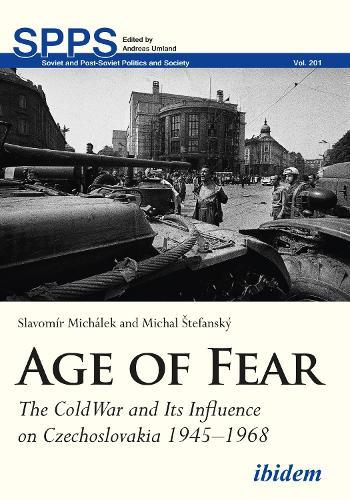Overview
"Czechoslovakia played an important role within the Soviet bloc, yet its history remains underresearched. This monograph blends historical analysis of the superpowers' foreign policies with an assessment of their impact on Czechoslovakia and its position within the Soviet bloc. The book thereby places Czechoslovakia on the map of Cold War history, i.e. the era of ""mutually assured destruction"" that lasted almost half a century. It provides a lucid introduction to some milestones in international Cold War history in their relation to Czecho-Slovak history. The book's novel contribution is to explain Czechoslovakia's domestic situation during the Cold War from the ""outside."" Drawing on extensive source materials of Slovak, Czech, American, and Russian provenance, it provides a more comprehensive understanding of postwar Czecho-Slovak history while also contributing to general knowledge about the nature and impact of the Cold War."
Full Product Details
Author: Slavomir Michalek ,
Michal Stefansky ,
Andreas Umland
Publisher: ibidem-Verlag, Jessica Haunschild u Christian Schon
Imprint: ibidem-Verlag, Jessica Haunschild u Christian Schon
Edition: New edition
Weight: 0.546kg
ISBN: 9783838212852
ISBN 10: 3838212851
Pages: 420
Publication Date: 30 April 2019
Audience:
Professional and scholarly
,
Professional & Vocational
Format: Paperback
Publisher's Status: Active
Availability: In Print

This item will be ordered in for you from one of our suppliers. Upon receipt, we will promptly dispatch it out to you. For in store availability, please contact us.
Reviews
This book presents a comprehensive survey covering all important milestones from the early post-World War II period until the first half of the 1970s from the perspective of a 'smaller' country in the Soviet bloc caught in the vortex of the Cold War. It will be a valuable source of information for English-reading students of Central Europe's recent history.--Jakub Dr bik, Institute of History, Slovak Academy of Sciences This study represents an important addition to different perspectives on the Cold War period. From both an interpretative point of view and the standpoint of the need for new empirical evidence, the study is a welcome new contribution. The book conveys new information from the archives, otherwise less accessible for foreign researchers, including documents from Czech and Slovak archives that are abundantly used.--Zuzana Polackov , Institute of Political Science, Slovak Academy of Sciences
This study represents an important addition to different perspectives on the Cold War period. From both an interpretative point of view and the standpoint of the need for new empirical evidence, the study is a welcome new contribution. The book conveys new information from the archives, otherwise less accessible for foreign researchers, including documents from Czech and Slovak archives that are abundantly used.--Zuzana Polackov , Institute of Political Science, Slovak Academy of Sciences This book presents a comprehensive survey covering all important milestones from the early post-World War II period until the first half of the 1970s from the perspective of a 'smaller' country in the Soviet bloc caught in the vortex of the Cold War. It will be a valuable source of information for English-reading students of Central Europe's recent history.--Jakub Dr bik, Institute of History, Slovak Academy of Sciences
This book presents a comprehensive survey covering all important milestones from the early post-World War II period until the first half of the 1970s from the perspective of a 'smaller' country in the Soviet bloc caught in the vortex of the Cold War. It will be a valuable source of information for English-reading students of Central Europe's recent history.--Jakub Drabik, Institute of History, Slovak Academy of Sciences This study represents an important addition to different perspectives on the Cold War period. From both an interpretative point of view and the standpoint of the need for new empirical evidence, the study is a welcome new contribution. The book conveys new information from the archives, otherwise less accessible for foreign researchers, including documents from Czech and Slovak archives that are abundantly used.--Zuzana Polackova, Institute of Political Science, Slovak Academy of Sciences
Author Information
Dr Slavomír Michálek is Director of the Institute of History at the Slovak Academy of Sciences in Bratislava. He is author or editor of, among other books, San Francisco 1945 (VEDA 2015), Gustáv Husák (VEDA 2013), 20 rokov samostatnej Slovenskej republiky (20 Years of Independent Slovakia, VEDA 2013), Za hranicou sloboda (Behind the Border, there Is Freedom, VEDA 2013) and Dubček (VEDA 2018). Dr Michal Štefanský worked at the Institute of Military History in Bratislava as well as Institutes of Political Science and History of the Slovak Academy of Sciences. In 1989, he was a member of the government commission for the historical analysis of the years 1967–1970. He is author of, among other books, Studená vojna a Slovensko 1946–1954/1955–1962 (The Cold War and Slovakia, VEDA 2008/2012) and Krízy režimov sovietskeho bloku (The Crises of the Soviet Bloc Regimes, VEDA 2007).




